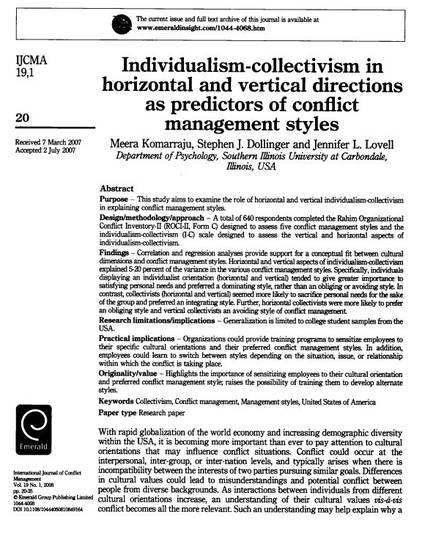
Article
Individualism‐collectivism in horizontal and vertical directions as predictors of conflict management styles
International Journal of Conflict Management
(2008)
Abstract
This study aims to examine the role of horizontal and vertical individualism-collectivism in explaining conflict management styles. A total of 640 respondents completed the Rahim Organizational Conflict Inventory-II (ROCI-II, Form C) designed to assess five conflict management styles and the individualism-collectivism (I-C) scale designed to assess the vertical and horizontal aspects of individualism-collectivism. Correlation and regression analyses provide support for a conceptual fit between cultural dimensions and conflict management styles. Horizontal and vertical aspects of individualism-collectivism explained 5%-20% of the variance in the various conflict management styles. Specifically, individuals displaying an individualist orientation (horizontal and vertical) tended to give greater importance to satisfying personal needs and preferred a dominating style, rather than an obliging or avoiding style. In contrast, collectivists (horizontal and vertical) seemed more likely to sacrifice personal needs for the sake of the group and preferred an integrating style. Further, horizontal collectivists were more likely to prefer an obliging style and vertical collectivists an avoiding style of conflict management.
Disciplines
Publication Date
2008
DOI
10.1108/10444060810849164
Citation Information
Meera Komarraju, Stephen J. Dollinger and Jennifer L. Lovell. "Individualism‐collectivism in horizontal and vertical directions as predictors of conflict management styles" International Journal of Conflict Management Vol. 19 Iss. 1 (2008) p. 20 - 35 Available at: http://works.bepress.com/jennifer-lovell/5/
